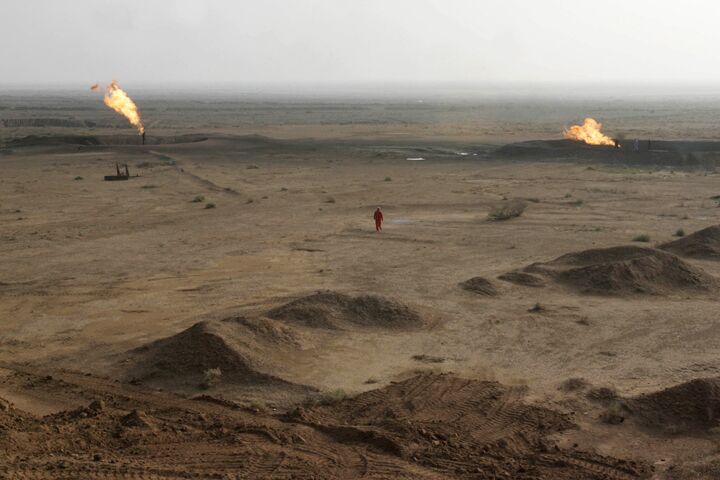
Iran Sends Message to Iraq—and U.S.
If anyone thought Iran would start treading carefully with international pressure on it growing, they were proven wrong—yet again—last week when Iranian troops occupied an Iraqi oil well.
A group of Islamic Revolutionary Guard Corps troops took over an oil well in the Fakka oil field, located in a remote region along the Iran-Iraq border, on December 18. The oil field is one of Iraq’s largest, with about 1.5 billion barrels of oil in reserves. The Iranians claim the well belongs to them.
The incident prompted an emergency meeting of Iraq’s national security council and high-level diplomatic talks between the two countries, though some Sunnis criticized the Shiite-led government for “a feeble response to the standoff” (Reuters, December 20).
The Iranian troops have reportedly since withdrawn, but it is evident the move was more to make a point than for any immediate practical purpose.
Analysts believe the incursion was designed to remind Iraq of the economic and political pull of its neighbor. While it’s not the first incident of its kind, its timing makes it particularly noteworthy.
Since the U.S. invasion of Iraq, Iran has extended its operations inside Iraq and now wields heavy influence over its neighbor socially, economically, religiously and politically. With Iraqi parliamentary elections coming up on March 7, Tehran is particularly interested in cementing its own political influence at this time.
Back in August, Iran was instrumental in creating a new Iraqi political alliance, led by the Islamic Supreme Council of Iraq (isci), and including other Iranian-backed Shiite groups. Iraqi Prime Minister Nouri al-Maliki, however, has refused to join the coalition, the Iraqi National Alliance, and has instead formed an independent political coalition, known as the State of Law. Iranian Stratfor sources report that Tehran is displeased with Maliki’s refusal to join the Iranian-backed coalition. “It appears that Iran is strong-arming al-Maliki and his political allies into rejecting U.S. backing and falling within Tehran’s political orbit” (December 19).
Perhaps Iran’s move has already had results. Stratfor reports that the day after the border flare-up, the political adviser to the isci based in Tehran apparently told Iran’s Fars News Agency that the State of the Law will form a national front with the isci following the March elections “to defend the Iraqi nation’s rights.” If this is true, Iran will have the elections in the bag. The United States is losing—or has already lost—the political battle for Iraq.
“The line in the sand has now been drawn, and pressure is piling on al-Maliki to define his political loyalties,” writes Stratfor. “If he gives in to Iranian pressure, Iran will have succeeded in showcasing its upper hand in Iraq” (ibid.).
But perhaps most of all, Tehran’s incursion into southern Iraq was intended to send a message to the U.S. and Israel.
Stratfor reported on Saturday that it had received “multiple reports from well-placed and high-ranking Iranian sources in the last 24 hours that have indicated that the Iranian incursion into southern Iraq was a deliberate warning to the United States ahead of the upcoming P-5+1 (the five permanent members of the UN Security Council plus Germany) conference call very tentatively slated for December 22.”
Iran is seeking to avoid U.S.-led gasoline sanctions—and military action. By seizing the Iraqi oil field, Iran has signaled how its response to any military attack would “endanger the stability of Iraq and complicate the U.S. timetable for withdrawing from the country” (ibid.). More than that, by its preemptive move, Tehran sought to make the point that the timing of any action would not necessarily be up to the U.S. or Israel. Iran’s move on the oil well caught the world’s attention and drove up oil prices. Stratfor reports (December 21):
The event eventually died down, and the Iranians went out of their way to minimize its importance. But two points nevertheless were made. The first was that Iran might not wait for Washington to consider all possible scenarios. The second was that the Iranians know how to raise oil prices. And with that lesson, they reminded the Americans that the Iranians have a degree of control over the economic recovery in the United States.
Tehran, in other words, is trying to put pressure on the U.S. to back down—to accept it as a nuclear power, or else be prepared for consequences. Its action last week was designed to demonstrate that it isn’t about to back down itself.
Whatever the immediate outcome, Iran has once again demonstrated its willingness and ability to complicate things for America in the Middle East if it does not get its way. On Sunday, Stratfor reported:
At this point, Iran is not under any real pressure to compromise because it believes that any sanctions regime will be ineffective unless Russia is ready to support it (and Tehran believes that Moscow is not). In addition, Iran believes that the costs of war are too high for the United States, and that were military action to take place, it would not significantly harm the regime. If anything, an attack by the United States or Israel could help rally domestic support, and further undermine the position of the opposition.
Iran’s action in southern Iraq is just the latest example of Iran’s persistently pushy foreign policy. Read our article from back in June 2003 titled “Is Iraq About to Fall to Iran?” for details on why we have consistently followed Iran’s rise in the region and, specifically, its interference in Iraq.
